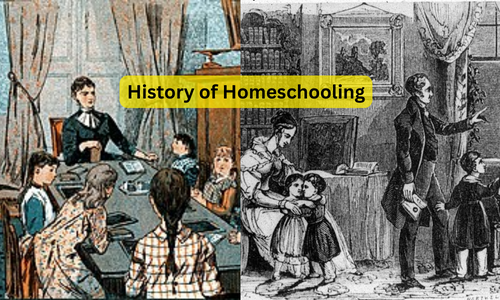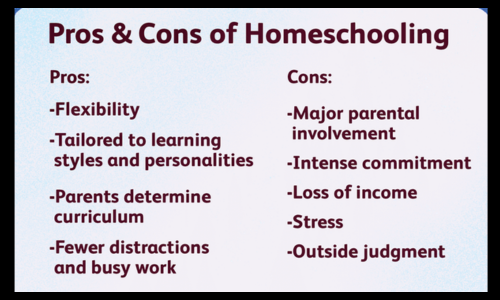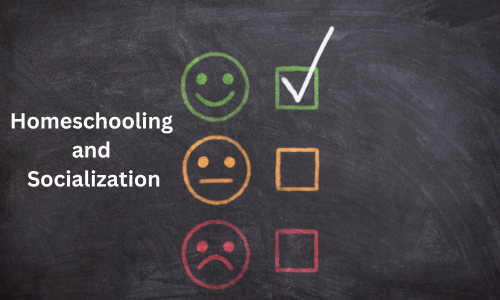Table of Contents
What is Homeschooling (H-Schooling)?
Homeschooling Defined
Homeschooling is an alternative form of education where parents or guardians choose to educate their children at home instead of enrolling them in a traditional school. In this approach, parents become the primary educators, taking on the responsibility of designing and implementing a personalized curriculum tailored to their child’s specific learning needs and interests.
Personalized Learning Environment
One of the key aspects of homeschooling is creating a personalized learning environment for the child. Unlike traditional classrooms with a fixed curriculum, homeschooling allows parents to adapt the teaching methods and pace of learning to suit the individual child’s strengths, weaknesses, and preferred learning styles.
You may like to read Writing Prompts for Middle School: Igniting the Creative Spark
The History of Homeschooling
Ancient Roots of Homeschooling
Homeschooling has ancient roots and has been practiced for centuries. In ancient civilizations, education often occurred within the family, with parents passing down knowledge and skills to their children. Additionally, historical figures such as Leonardo da Vinci and Thomas Edison were homeschooled, demonstrating that this form of education has produced notable intellectuals throughout history.

Modern Resurgence of Homeschooling
The modern resurgence of homeschooling began in the 20th century, gaining momentum in the 1970s and 1980s. It was driven by various factors, including dissatisfaction with the conventional education system, a desire for more control over children’s education, and the belief that homeschooling provides a safer and more nurturing environment for learning.
Why Do People Choose Homeschooling?
Dissatisfaction with Traditional Education
One of the primary reasons parents choose homeschooling is their dissatisfaction with the traditional education system. They may feel that traditional schools are unable to meet the specific needs and learning pace of their children or that the educational environment is not conducive to optimal learning.
Desire for Personalized Education
Homeschooling allows parents to create a highly personalized educational experience for their children. Parents can tailor the curriculum to align with their child’s interests, strengths, and future aspirations, fostering a love for learning and a deeper engagement with the material.
Safe and Nurturing Learning Environment
For some families, concerns about safety and social issues in traditional schools drive them towards homeschooling. They believe that homeschooling offers a safer and more nurturing learning environment, free from peer pressure, bullying, and other negative influences.
Also Read The Importance of Literature: Unraveling Human Imagination
Pros and Cons of Homeschooling
Advantages of Homeschooling
- Individualized Attention In H-Schooling, children receive one-on-one attention from their parents, allowing for a focused and personalized approach to learning. This individualized attention can significantly benefit children with specific learning needs or challenges.
- Flexibility in Scheduling H-Schooling provides families with the flexibility to create their own schedules. This flexibility allows parents to adjust the learning routine to accommodate family vacations, extracurricular activities, and other commitments.
- Instilling Personal Values H-Schooling enables parents to incorporate their values, beliefs, and cultural heritage into the curriculum. This allows children to develop a strong moral and ethical foundation based on their family’s principles.
- Tailoring Education to Individual Interests H-Schooling allows children to explore subjects and topics of personal interest in-depth. As a result, children are more likely to develop a passion for learning and pursue their interests further.
Challenges of Homeschooling
- Strong Parental Commitment Required Homeschooling demands a significant commitment from parents, as they become not only educators but also full-time caregivers for their children’s education. This can be time-consuming and may require adjustments to parents’ work schedules.
- Limited Socialization Opportunities One common criticism of homeschooling is the potential lack of socialization with peers. Parents must make a concerted effort to engage their children in social activities and community events to ensure they have opportunities to interact with other children.
- Balancing Multiple Responsibilities Homeschooling parents often face the challenge of balancing multiple responsibilities, including household tasks, work commitments, and their role as educators. This juggling act can be challenging and may lead to feelings of stress or burnout.

Read further about Home Schooling Pros and Cons.
Read Also, Critical Race Theory: Examining Racism and Power Dynamics
Getting Started with H-Schooling
Researching Legal Requirements
Before embarking on the H-Schooling journey, parents must thoroughly research the legal requirements for homeschooling in their country or state. Each region may have specific regulations that homeschooling families must comply with to ensure their child’s education is recognized.
Setting Clear Educational Goals
Setting clear educational goals is essential for homeschooling success. Parents should identify their child’s strengths, areas of improvement, and long-term educational objectives. This process will help shape the homeschooling curriculum and guide the learning journey.
Creating a Conducive Learning Environment
Establishing a conducive learning environment at home is critical for effective homeschooling. This includes designating a dedicated space for learning, ensuring access to necessary learning materials, and minimizing distractions during study sessions.
Setting Up a Homeschooling Curriculum

Customizing the Curriculum
H-Schooling offers the advantage of a fully customizable curriculum. Parents can select educational materials and resources that align with their child’s interests, learning style, and developmental stage. This customization allows for a more engaging and relevant learning experience.
Adapting to Age and Grade Levels
Parents should adapt the curriculum to suit their child’s age and grade level. Age-appropriate learning materials and activities are essential for maintaining the child’s interest and ensuring they stay on track with their peers’ academic progress.
Homeschooling Methods and Approaches

Different Approaches to H-Schooling
Homeschooling provides a range of educational methods and approaches that parents can choose from, based on their child’s learning style and their own educational philosophy.
Classical Education
The Classical education approach focuses on the “trivium” of grammar, logic, and rhetoric, aiming to cultivate critical thinking and communication skills.
Montessori Method
The Montessori approach encourages self-directed learning, hands-on exploration, and individualized instruction.
Unschooling
Unschooling promotes child-led learning, where children are encouraged to explore their interests freely and pursue learning organically.
Exploring Innovative Teaching Techniques
Homeschooling allows parents to incorporate innovative teaching techniques and tools, such as educational games, virtual learning platforms, and experiential learning activities, to enhance the learning experience.
Best funny debate ideas of All time
H-Schooling vs. Traditional Schooling

Comparing Classroom Structure
Traditional schools typically follow a standardized classroom structure with set daily schedules and subject rotations. In contrast, homeschooling allows for a more flexible and adaptable learning environment.
Teacher-Student Ratios
Traditional schools often have larger class sizes, resulting in less individualized attention for each student. Homeschooling, on the other hand, typically involves a low student-to-teacher ratio, allowing for more personalized instruction.
Social Experiences
Traditional schooling provides children with daily social interactions with peers, teachers, and other school staff. H-Schooling families need to actively seek socialization opportunities for their children, such as participation in community events, sports teams, and extracurricular activities.
H-Schooling and Socialization

Addressing Socialization Concerns
One of the common misconceptions about homeschooling is the belief that homeschooled children lack sufficient socialization opportunities. In reality, homeschooling families often actively seek social interactions with their children through various means.
Community Events and Activities
Homeschooled children can participate in community events, local clubs, and extracurricular activities to interact with peers and develop social skills. Additionally, homeschooling co-ops and support groups provide opportunities for children to engage in group activities and collaborative learning experiences.
Local H-Schooling Co-ops
Joining local H-Schooling co-operatives allows children to interact with other homeschoolers regularly. These co-ops often organize educational outings, field trips, and group learning sessions, fostering a sense of community among homeschooling families.
Legal Aspects of H-Schooling

Understanding Legal Requirements
Before starting H-Schooling, parents must familiarize themselves with the legal requirements and regulations related to homeschooling in their region. Each country or state may have specific laws governing homeschooling, such as registration procedures, reporting requirements, and educational standards.
Varying Regulations by Region
The legal landscape for H-Schooling varies from one region to another. Some areas may have relatively lenient regulations, while others may impose more stringent requirements. It is crucial for homeschooling parents to stay informed about the specific laws applicable to their location.
Complying with Educational Laws
H-Schooling parents must ensure that they comply with all educational laws and guidelines relevant to their homeschooling program. This may include maintaining records of educational progress, submitting required documentation, and participating in assessments or evaluations as mandated by local authorities.
H-Schooling Resources and Support
Tapping into the Homeschooling Community
The H-Schooling community offers a wealth of resources and support for parents embarking on the homeschooling journey. Connecting with other homeschooling families can provide valuable insights, advice, and encouragement.
Online Platforms and Forums
Numerous online platforms and forums cater to H-Schooling parents, providing access to educational materials, lesson plans, curriculum ideas, and teaching resources. These virtual communities foster collaboration and information-sharing among homeschooling educators.
Local Homeschooling Groups
Joining local homeschooling groups and associations facilitates networking with like-minded families in the area. These groups often organize social events, workshops, and cooperative learning opportunities for children and parents.
Educational Materials and Curricula
A wide array of educational materials and curricula are available to support homeschooling parents. From textbooks and workbooks to online courses and multimedia resources, these materials can supplement the homeschooling curriculum and enhance the learning experience.
Tips for Successful H-Schooling
Establishing Routines and Schedules
Creating a consistent and structured daily routine helps maintain focus and productivity in H-Schooling. Having designated study periods, breaks, and mealtimes can provide a sense of structure and help children establish a sense of predictability in their daily lives.
Setting Realistic Expectations
H-Schooling parents should set realistic expectations for their child’s academic progress and overall learning journey. Acknowledging that each child learns at their own pace and may have individual strengths and weaknesses can alleviate unnecessary pressure and stress.
Maintaining Open Communication
Open communication is key in homeschooling. Encouraging children to share their thoughts, questions, and concerns fosters a supportive and trusting learning environment. Additionally, parents should maintain open communication with other H-Schooling parents to exchange ideas and strategies.
Implementing Effective Teaching Strategies
H-Schooling allows parents to tailor teaching strategies to their child’s learning style. Implementing diverse teaching methods, such as hands-on activities, visual aids, and interactive learning, can cater to different learning preferences and enhance understanding and retention.
Incorporating Interactive Learning Activities
Engaging children in interactive and hands-on learning activities promotes active participation and fosters a deeper understanding of the material. Experimentation, creative projects, and real-world applications of knowledge can make learning more enjoyable and relevant.
Overcoming Challenges in H-Schooling
Managing Time and Burnout
H-Schooling parents must effectively manage their time and energy to balance H-Schooling responsibilities with other commitments. Establishing boundaries and taking breaks can help prevent burnout and maintain a healthy work-life balance.
Adapting to Different Learning Styles
Understanding and adapting to each child’s learning style is crucial for effective H-Schooling. Some children may thrive with visual aids, while others may excel with auditory or kinesthetic learning methods. Being flexible and catering to individual learning preferences can enhance the learning experience.
Finding Solutions to Common Hurdles
Every H-Schooling journey comes with its unique challenges. H-Schooling parents should seek advice and support from experienced homeschoolers, online communities, or local support groups to find solutions to common hurdles. Sharing experiences and learning from others can be invaluable in overcoming challenges.
Conclusion
Empowering Parents in Education
H-Schooling empowers parents to take an active role in their children’s education, enabling them to have a direct impact on their child’s learning journey.
Tailored Learning and Nurturing Environment
H.S. provides a unique opportunity for tailored learning that caters to the individual needs, interests, and abilities of each child. The nurturing environment of home-based education fosters a positive and supportive atmosphere for learning and personal growth.
Fostering Love for Learning
The flexibility and freedom of H.S. allow children to explore subjects they are passionate about, cultivating a love for learning that extends beyond the traditional classroom setting.
Academic Achievements and Personal Growth
Homeschooled children have the opportunity to achieve academic excellence while also experiencing personal growth and development. The customized educational approach of homeschooling equips children with essential life skills, critical thinking abilities, and a lifelong love for learning.
FAQs
Q1. Is homeschooling legal?
The status of H-Schooling is legal in many countries and regions worldwide, but the specific regulations and requirements may vary. Before starting homeschooling, parents should research and comply with the legal guidelines applicable to their location.
Q2. Do homeschooled children perform well academically?
Research and studies have shown that homeschooled children can perform at or above the level of their traditionally schooled peers. The personalized and tailored approach to education often contributes to academic excellence in homeschooling.
Q3. Can I homeschool multiple children with different learning needs?
H-Schooling can accommodate multiple children with varying learning needs and abilities. Flexible teaching methods and individualized attention make it possible to cater to each child’s unique educational requirements.
Q4. How do H-Schooled children socialize with others?
Homeschooled children can socialize with others through various avenues, such as community events, sports teams, extracurricular activities, and participation in local homeschooling co-ops. Additionally, online platforms and virtual interactions provide opportunities for social engagement with peers.
Q5. What if I’m not an expert in all subjects?
H-Schooling parents do not need to be experts in every subject. Numerous resources, including educational materials, online courses, and tutoring services, are available to support parents in delivering a well-rounded education to their children.








